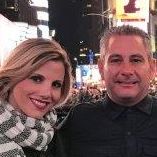
Featured Item

Invigorated Fed gets noticed on world stage
ANT KATZ
Top-team presents in NYC
The national top team of lobbyists for Israel had been involved in Israel advocacy before, but 2016 has seen them redefining the organisation’s priorities and strategies.
Swartz took over the chair early in 2015 from long-serving Avrom Krengel who had seen out his maximum allowed eight years. Raz came later, taking over what is effectively the CEO position from a retiring Isla Feldman – after a legendary 35-year-long reign – in January this year.
 Do the two work well as a team? “We get each other,” says Swartz. “Great,” says Raz. And, adds Swartz, the Fed’s very strong team in Cape Town and other centres around the country, have played a huge part in the process of rejuvenation.
Do the two work well as a team? “We get each other,” says Swartz. “Great,” says Raz. And, adds Swartz, the Fed’s very strong team in Cape Town and other centres around the country, have played a huge part in the process of rejuvenation.
RIGHT: From left: Ben Swartz; Julie Berman, executive director of the SAZF’s Cape Council; Ginette Searle, executive director of Zionist Federation of Australia and Nicci Raz at Times Square in New York last month where the Fed presented some of their programmes to key Jewish leadership
Swartz said Raz had “made it her business to know how the community perceives the Fed”. Raz herself, has set herself some tough goals, like how to effectively engage with the community’s “middle-tier” – those aged between 25 and 35, who have historically been difficult for communal organisations to reach and get involved.
“It has been a year of revitalisation and reorganisation,” explains Raz. Swartz says that Raz has been able to “mix her corporate experience with communal work”. This, he posits, has led to a new “results-orientated organisation”, which has had the effect of “pushing people out of their comfort zone”.
The SAZF 2017 is very different from the 2015 version of itself, says Swartz, and today has a “dynamic of constant renewal”. While full of praise for the foundation of success of their predecessors, Swartz and Raz say that lobbying for Israel these days requires pushing boundaries, setting goals and measuring results. In the fast-moving digital world we live in today, says Swartz, it is essential to be prepared to have to react quickly.
Working together makes them stronger
 “Whenever we deal with major issues we do so in collaboration and consultation with our affiliates and strategic partners,” says Swartz.
“Whenever we deal with major issues we do so in collaboration and consultation with our affiliates and strategic partners,” says Swartz.
“The strength of our affiliates and primary partners adds a huge degree to any success we are able to achieve.”
Their primary partners are the likes of the Jewish Agency’s Israel Centre, the SA Jewish Board of Deputies and the Fed’s own structures around the country.
Their second tier of affiliates and partners include the many and various organisations and associations of people who love Israel, in South Africa and Africa, Jews and non-Jews alike.
So what’s new?
Swartz has noted the uptick among Jewish community organisations and other NGOs and civil society organisations seeing the value of what the Fed is doing. According to him, the Fed has become the “go-to” organisation for people seeking collaboration and assistance, not just in South Africa, but even global Jewish organisations are noting what the Fed is doing, he says.
Some of the strategic objectives and changes the two have instituted – most of which have already been implemented or are in the process of being so – are:
- Moving to a “proactive stance” to be prepared to deal with anti-Israel lobbyists;
- Becoming part of the digital revolution;
- Through the SAFI initiative, reaching further into pro-Israel community (the SAFI organisation recently passed the 100 000-member threshold);
- Improving the working dynamic between the Cape, Durban and Johannesburg. “We are all on same page,” says Swartz;
 Growing South Africa’s pride of place in programme’s like the Diller Foundation and the Jewish Agency’s Project TEN and Na’ale programmes;
Growing South Africa’s pride of place in programme’s like the Diller Foundation and the Jewish Agency’s Project TEN and Na’ale programmes;- Looking at new-hires who are tech-savvy;
- Reaching out and collaborating with younger Jews;
- Being more proactive in media moderating and campaigns.
Among the big-ticket events of 2016 were finding private sponsors and building a new national office at Beyachad – PICTURED RIGHT. Raz says this was done as the Fed needed more space, a more open-plan environment and to add rejuvenation to the workplace.
Another large portion of the Fed’s resources have been directed to assisting seedling organisations, supporters and friends of Israel within South Africa and Africa, says Swartz. In terms of civil society organisations, there are over 20 fledgling groups in South Africa alone.
“This is not just pie in the sky,” says Swartz. The Fed has held numerous events in 2016 where more than half of the attendees were not Jewish.”
It is easy to know if one is doing a good job in communal Jewry, says Swartz. “When you do a bad job in the community, people tell you. We have had less and less of that,” he says.
Related reads on JR Online:




